Aug 26, 2023
Akhtar Badshah
Akhtar Badshah is a seasoned professional with a diverse background encompassing architecture, nonprofit leadership, corporate philanthropy, and purpose-driven consulting. With a PhD in architecture, Akhtar has taught at MIT and worked extensively in the nonprofit sector, focusing on technology access for underserved communities. During his tenure at Microsoft, he led the company’s corporate philanthropy efforts, setting up technology learning centers globally.
Currently, Akhtar runs purpose mindset workshops, aiming to help individuals recognize their purpose in life. He is the founder of Catalytic Innovators Group, focusing on positive change through collective action. Akhtar is also an accomplished artist, reflecting his creative and holistic approach to life. He is passionate about shifting mindsets from transactional to purpose-driven, emphasizing the importance of working with strengths and fostering empathy and compassion.
One Line Life Lessons from Akhtar
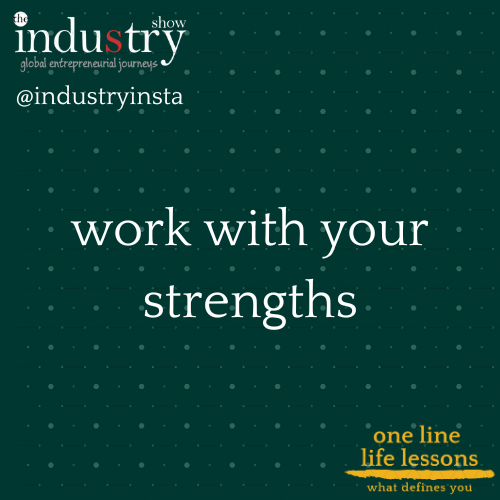
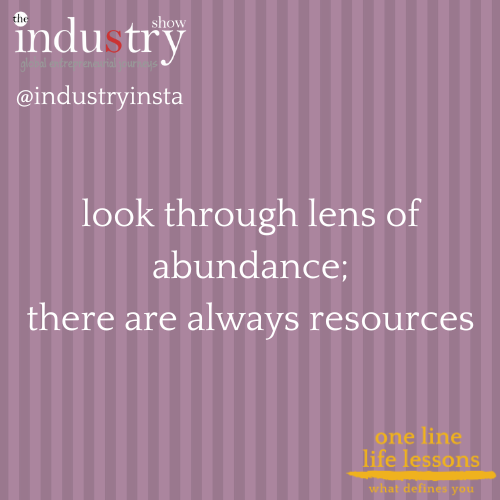
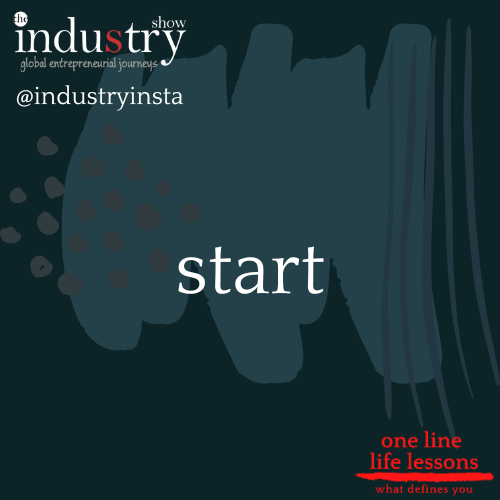
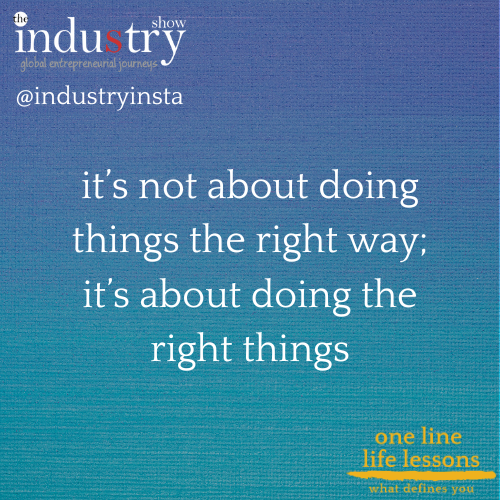
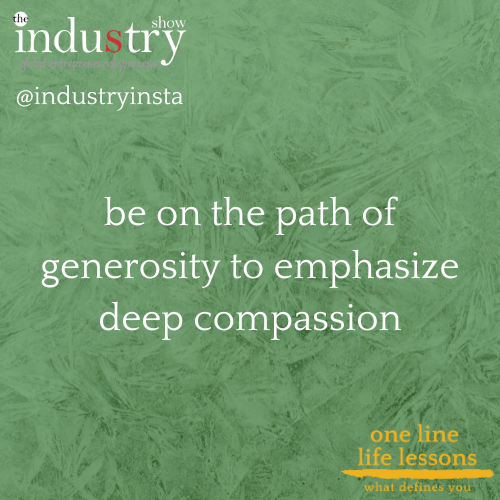
Episode Highlights
- Introduction (0:02 – 0:20): Nitin Bajaj welcomes Akhtar Badshah to the show.
- Who is Akhtar? (0:22 – 3:20): Akhtar discusses his background in architecture, work in the non-profit sector, and experience at Microsoft, highlighting his focus on making the world a better place.
- Purpose Workshops (4:37 – 8:47): Akhtar talks about his purpose workshops and the Catalytic Innovators Group, emphasizing the importance of spreading ideas and impact.
- Challenges (9:05 – 11:42): Akhtar discusses the challenge of shifting from a transactional to a purpose mindset, both individually and in society.
- Opportunities (14:54 – 18:26): He highlights the opportunity to spread the purpose mindset and create a movement for positive change.
- Success and Failure (19:05 – 23:54): Akhtar reflects on the concept of success and failure, emphasizing the importance of learning and not getting mired in either extreme.
- One-Line Life Lessons (25:16 – 29:02): Akhtar shares his five principles: work with your strengths, put on a lens of abundance, focus on doing the right thing, ignite movements, and move from generosity to deep compassion.
- Closing Thoughts (29:36 – 29:55): Nitin thanks Akhtar for sharing his journey and insights, highlighting the significance of every change and step forward.
Show Transcript
Transcript - Full Episode
[Nitin Bajaj] (0:02 – 0:11)
Hey everyone, welcome to the industry show. I’m your host Nitin Bajaj and joining me today is Akhtar Badshah. Akhtar, welcome on the show.
[Akhtar Badshah] (0:12 – 0:15)
Thank you very much, Nitin. Looking forward to the conversation.
[Nitin Bajaj] (0:16 – 0:20)
So am I. Thanks for being here. Let’s start with who is Akhtar.
[Akhtar Badshah] (0:22 – 3:20)
So, I mean, it’s an interesting question, right? I mean, you know, so I’m an individual who has constantly strived from very early on to use my acumen and know-how and skills to make the world a better place. And I’ve done that in different avatars, if you want to use that word. One, as an architect, where I was teaching architecture at MIT around Islamic architecture at a very young age and really trying to get people to understand the importance of historical significant communities and modern interventions. And how do you kind of deal with these two contrasting conditions? I then spent time in the non-profit sector where I worked on large cities, mega cities, you know, when we started off in 1993, there were 10, now there are 50. And then I launched a non-profit that was focused on bridging the digital divide in 1999. And we were basically working with diaspora communities to bring their know-how and acumen and tech talent to support social entrepreneurs in their home countries that are trying to extend the benefits of technology to the underserved community. From there, I joined Microsoft and ran Microsoft corporate philanthropy. And again, working with underserved communities around the world, helping set up over 70,000 technology learning centers in 102 countries. So really working in different dimensions. So these are areas where I have no qualifications in. I mean, I have a PhD in architecture, but that’s about it. And now, you know, I spend time teaching. I have a consulting firm and I run these purpose mindset workshops where I’m focused on ensuring that every single individual in the world is able to recognize their purpose, their why, and not just focused on the how and the what they do. So that’s kind of in a nutshell, you know, who I am.
[Nitin Bajaj] (3:21 – 4:36)
That’s amazing on so many different levels. The impact is just beyond my imagination. And I think you left out several things, one of which I know you are an artist. We see some of your art right behind you, some amazing stuff that you have brought to life. And just the breadth and the depth of your experience is just mind blowing. And the purpose workshops that you mentioned, you know, I was fortunate to experience a very thin slice of it. And I saw you work the room with some very highly accomplished people and making them pause and think. And even though, you know, we hardly had a few minutes, the impact you created just from putting that question and the way you put it to them was extremely powerful. So thanks for doing what you do. And, you know, I would love to hear a little more about the mission, the vision, and the what you’re doing with the Catalytic Innovators Group. Give us a sense for the work, the size and scale of the operations, and more importantly, the impact.
[Akhtar Badshah] (4:37 – 8:47)
Yeah, so I really don’t focus on scale, because I feel that it is really a predominantly Western notion. And in a way, even in a Western notion, it is very much a notion promoted by business leaders and entrepreneurs where they think everything has to scale. I actually think things need to spread. Ideas spread, ideas don’t scale. Impact spreads, impact doesn’t scale. So I’m not in this franchise model of a McDonald’s where everything has to be controlled by one individual. I’m far more interested in people taking ideas and running with it, and developing it in their own ways. So Catalytic Innovators Group kind of came about with this naive notion after I left Microsoft. I said, OK, I’ll kind of divide my time up into three segments. One segment I’ll teach, you know, and go back into my teaching roots and, you know, impart some, you know, insights to the younger generation. A part of my time I will consult and work with, you know, select few individuals and organizations that might need my attention or insights or, you know, if I might be able to bring any value to them. And then the third of my time, I will, you know, participate in larger gatherings, convene gatherings, and now create a movement which can kind of lead to change and positive change. So that’s essentially what Catalytic Innovators Group is all about, which is a bunch of people that come together to do things. And what has happened is that instead of my life being divided into threes, it’s actually now become 300%. Because each of these has actually become almost a full-time job. So it’s kind of, you know, I end up working every day. I’m up at 5 o’clock. I work till 8, 9. And to me, it’s not work, right? I mean, it’s you’re spending time with people. In fact, I mean, you know, this week I’ve done three purpose mindset workshops for about 750 young people that Avanade has brought together in a conference called FUEL, where these are their STEM scholars, their interns, their young employees. And that’s awesome. And these are the people from Japan to Australia to Argentina to India to Europe to Latin America to US. And you kind of get to shape people’s mind by just getting them to ask that question, why do you exist? And just for them to spend a few minutes just self-reflecting. So that’s what we’re doing, right? And at some point, I mean, I kind of tell, you know, whoever goes through my workshops and exercises, if you take, I mean, you know, what I do is very simple. I’m not doing anything complicated where you need an IP or anything. I mean, I give you a platform, I ask you a few questions, you fill something out, you can take that same thing and do it in your community. I would never know and I would not care. Actually, in fact, I would love it if you do it, David, because I guess more people are getting introduced to this idea in different ways, right? The world is large enough and diverse enough with different thoughts and different ideas into the space. So that’s what I do. That’s how I spend my time. And, you know, scale is kind of neither here nor there. I mean, you know, we now spend a lot of time doing all this work anyways.
[Nitin Bajaj] (8:48 – 9:02)
I love that. Tell us, you know, in the myriad of things, the people, the dimensions, the geographies you operate in, what’s that one big challenge you’re facing?
[Akhtar Badshah] (9:05 – 11:42)
So I think the, I know, I mean, people, you know, love to ask these questions of what’s the challenge and I’m really not sure that there is any challenge. I’m doing what I’m doing. Should I be doing more? Sure. Should more people be doing this? Great. But is that really a challenge? It’s not. I mean, it’s, but let me, let me circle back and say, where is the, what’s the issue that we’re trying to address? We live in a world which is primarily transactional driven. Yes. Right. So we are in a transactional world, right from early age, we get our kids to become transactionally focused. We reward them for an action that they do. You know, hey, don’t make noise. I’ll give you candy. Go to bed early. I’ll give you this. It’s your birthday. I’ll reward you with that. And that’s the mindset we’ve kind of got. Right. So, so eventually when they come of age, we basically ask them, what are you, what are you going to be? Be a doctor, be an engineer, be a something. But we are never really focused on getting people to really start asking, why are you here? What are your strengths? What are your values? Right. So we spend way too much time focused on, okay, let’s improve, let’s grow, let’s overcome our problems. Don’t be a know-it-all. And that’s all correct and right. But there is also value in actually understanding what are you good at very early on, and at least being aware of it. And at almost any given time, showing up with that. So the work that we do, especially in companies, where we go into companies and work with people like yourself and others who are listening to the podcast, the challenge is that we’ve been so imbued with our transactional mindset, to getting people to change and put on a purpose mindset is very hard. Starting early in kids is where you can actually see far more change. So that’s the friction, that even people want to be part of the purpose mindset, they want to apply their purpose and want to focus on their why, and they truly want to see the world improve.
We’ve got caught up into all of our dimensions that are only focused on a reward-based system.
[Nitin Bajaj] (11:45 – 11:45)
So true.
[Akhtar Badshah] (11:45 – 14:11)
And that reward has been primarily focused on the me. What’s in it for me? And we stop worrying about the collective good, and the common good, and the society at large in which we are seeing it play out right around history. I mean, nations are fighting, our citizens in this country is divided, our politics is toxic, right? I mean, at every given point in time, every company, you know, talks about companies and business as if they’re in war. Let’s go crush our competition. Let’s bring it all cost. Why do you want to crush your competition? They’re also trying to make a living. What are you going to have dead people all around you who’s going to buy your stuff? So this notion of aggressiveness is that let’s go win at all cost. No, you don’t have to win at all cost. Have you really thought what you’re providing? Is it good for society is going to make a difference? First focus on that, and financial rewards will come, growth will come, success will come. The success is multi-dimensional. So how do we kind of think about that? So these are the kinds of issues we get people to reflect on. I mean, I came from a highly hyper competitive company, right? I mean, Microsoft, it’s like, you know, but why? I mean, we’re just selling stupid software. It’s not even life or death. So to kind of go in with this hyper-aggressive attitude, I mean, it’s one thing to say, hey, I’m going to be hyper-aggressive to feed the poor, because nobody should go hungry and let’s make sure that everybody is, now I understand. But some of this, I mean, yes, of course, it is important.
But I think that we just need to, you know, step back and be a little bit more inclusive and not become hyper-competitive where we want to win at all cost.
[Nitin Bajaj] (14:13 – 14:53)
I agree. And, you know, it’s important to have that perspective, right? Why are we doing this?
And it’s not, as you said, life and death in every situation. And it doesn’t have to be at the expense of, it can be that notion of abundance that you started off with. So thanks for sharing. I mean, that is a big challenge. I mean, we are not wired, we are not geared, our societal aspirations are not aligned with that mindset. So I can see how that can be a big challenge to overcome. On the other side, though, lies the opportunity. And there’s so many of them. What’s the one that you’re most excited about?
[Akhtar Badshah] (14:54 – 18:26)
I mean, I think that, you know, I mean, what we are excited about is the fact that when we go do these workshops, we see immediate change, right? I mean, you notice the change. And we just did it for five minutes, right? I mean, I do these workshops for two hours for a whole day. And you suddenly see something click in people’s brains. And that’s the opportunity. The opportunity is how can we get, how do we get this to spread? How do we take this idea and say, it’s not just Akshay who’s going to run these workshops, but you know, there’ll be thousands of other people who will take this and run it. How do we create a movement? And that’s the opportunity. There are millions of people are participating in it. It doesn’t have to get IP. It doesn’t have to be controlled by one individual. But how do you kind of get it to a point where thousands of people are actually going through this and saying, yeah, I’ll go do this. I’ll work with my friends, and I’ll introduce it to my community. I’ll do it with my kitchen table. I’ll take it into my classroom. So that’s the right. But the thing is that we’ve been kind of taught not to do that. Oh, this is his property. So we should not steal the great thing. I don’t care. I mean, every large company has stolen stuff for everybody else, right? And we reward them. I mean, now everybody’s kind of talking about AI and you know, Chad GPT, and all of that and all of that knowledge has come from a bunch of people who actually make money off that. Right? I’m an author. But Chad GPT is basically going through my stuff. And then sharing it with everybody else without actually giving me any credit. It’s taking my art and using that as a way to recreate other people’s art. There’s an artist who actually does some work. I mean, his art has been reproduced 400,000 times by Chad GPT and Chad Daly, more than Picasso. He now cannot recognize whether that is his original art or fake art. So what happens to his livelihood? So we are so thrilled about this thing, but we are, you know, it’s not coming from for free. People have basically created this content. And there’s some dumbass kid decided to write some code and steal it. And we’re all saying, yeah, great. And so we live in this very awkward world. Yes. So and then people kind of look at that’s progress. No, it’s not progress. I mean, real progress would be the people who are basically running these engines are actually going to say, yeah, we’ll pay for your cost of your art. Every time it’s going to be abused, we’ll give you $10,000. Now, everybody will stop using it. So we’ve been down in this very awkward thing, right? So we kind of on one side, these companies file IP to protect it. But they’re happy to steal everybody else’s content.
And so that’s progress. And so we live in this very awkward world.
[Nitin Bajaj] (18:27 – 19:03)
We do. So, you know, as we talk about the present and the future, I want to take a pause and reflect and take a look in the rear view mirror and ask you to share two moments in time, one in which things succeeded beyond your imagination. And, you know, it was a huge success that you do not anticipate. And on the other end, something that did not work out, as you had expected, and it became a failure was a lesson.
[Akhtar Badshah] (19:05 – 23:54)
Yeah, so I mean, I think, so here’s this very interesting thing, right? So when you put on a lens of purpose, purpose, actually purpose mindset helps you develop contentment and fulfillment, which essentially means that you’re really not going through high and lows. See, when you have success, you’ll say, okay, fine. And then you have failures, you say fine. So for me to sit back and reflect on what was widely successful, okay, great. I mean, you know, we did 700,000, 70,000 centers. It was really my success? Not really. But that scale, right? We supported that many organizations, hundreds of millions of people got access to technology. But at the end of the day, there were 70,000 different people who actually created this. We just managed to support them. So do I actually claim that as my success? No. But I also claim it as my success that I was able to move a company to actually think beyond just supporting one or two groups of people and scaling from there to versus doing a very distributed effort and really getting out into the community. And that did help change Microsoft perspective, because when I joined Microsoft in 2004, and I was in the Bay Area for a conference, right after I joined, I was basically introduced by, you know, Mr. Gage from Sun Microsystems as our friend Akhtar who’s gone to the evil empire. And nonprofits hit at Microsoft. Today, it’s one of the most beloved companies in the nonprofit sector. I changed that around. So, okay, fine, great. So, we did that. But was that wildly successful? Probably not, because in some ways, we’re still scratching the surface of what the needs are out there and the resources that are available. On the other side, we haven’t really moved the dial in how resources flow.
I mean, take COVID. You had COVID, which is a once in a lifetime situation. Millions of people died, economy got, the poor became poorer. We got a little bit of an uptick in generosity, in philanthropy. But we really didn’t get anybody come out and say, you know what, I pledge to give away half my wealth. But I’m going to give half of that now, because we need it. Nobody did that. I’d say everybody kind of treated it as, yeah, okay, incremental. But it was like, yeah, okay, fine. But this is literally, you’re not going to get the situation again. Right? This was once in a lifetime opportunity to make significant change. But we didn’t. As a society, we didn’t. None of us did. So to claim wild successes. So in the retrospect, you know, there were so many things we tried that didn’t work. But were there wild failures? Not really. I mean, you know, there were learning opportunities. We kind of went in thinking, oh, just because we’ve shown up, people will open their doors. But that’s not true. Right? I mean, you still have to work at it. So I always feel that there isn’t, one has to be very careful in projecting how you see yourselves as successful, and how you also not get mired into your failures. Actually, if you kind of take a slightly less involved look, in a personal way, then I think from a fulfillment perspective, you actually become much more, you know, even keen, which is why I’m actually not using the word happiness.
[Nitin Bajaj] (23:56 – 24:15)
I can, I’m not surprised that the wise choice of words, neither with the wisdom that comes with those experiences where there are no wild swings, it’s, you know, as economist as one can and should be. So not being.
[Akhtar Badshah] (24:15 – 24:24)
So you are getting, I mean, you are getting that, right, that you are actually having successes, and you have some challenge failures.
[Nitin Bajaj] (24:24 – 24:24)
Sure.
[Akhtar Badshah] (24:25 – 24:42)
Right. But how do you not see it as widely successful or widely failure, but see that, okay, I got some success, I failed, let’s get out of it and move on.
[Nitin Bajaj] (24:42 – 24:53)
Yes. It’s more of a feedback loop, then, oh, I’m going to write this high and, and kind of make it personal, either about the success or the failure.
[Akhtar Badshah] (24:53 – 24:55)
Exactly. Yes, exactly.
[Nitin Bajaj] (24:56 – 25:15)
Makes sense. But then I would love for you to share what we call some one line life lessons. These are not quotes, but things you have either come to define or adopt, and make them your own simple one liners, but profound.
[Akhtar Badshah] (25:16 – 29:02)
Yeah, so I kind of tell you the five principles that I actually highlighted in my book. First and foremost, work with your strengths. It is critical that you work with your strengths. And it is actually a neurological phenomenon. Our brain reacts much more effectively when we are actually being positive. Praise people, smile at people. There’s no harm, even if somebody doesn’t smile back, smile. It actually makes you feel good, because it releases serotonins and chemicals in your brain that actually make you feel better. So, strengths.
Second, put on a lens of abundance. There are always resources. Start. Start somewhere. It might take a little time, but start. Third, which I think is actually the most important one.
It is not about doing things the right way. It is about doing the right thing. And how do you distinguish between being efficient versus effective? Fourth, we are in the age of igniting movements. We’re no longer in the age of creating organizations. So, how do you ignite movements and bring others along? And how do you act as a catalyst? How do you act as a conductor, rather than a manager and a leader? There are no more leaders. This whole notion of leading from behind, leading from front is all nonsense. There are no leaders. You can either catalyze, or you can conduct. You can ignite. So, how are you going to think about that? And fifth is, how do you move on that path from generosity to empathy to deep compassion? And deep compassion actually comes about when you are fully focused on the collective good, and yourself is completely removed from it. Now, Kailash Satyarthi, who won the Nobel Peace Prize, told me that compassion is that center dot. Surrounding that is empathy and generosity is the outer ring. Most of us are never going to get to that deepest level of compassion. He is where he is willing to give his life for helping the underserved or Malala Yousafzai or the Dalai Lama or Nelson Mandela or Martin Luther King or Mahatma Gandhi or, you know, pick your favorite. Most of us are not going to be that. But we can be on that path of understanding how to extend empathy into compassion. And if we can even get a sliver of the common good as a driver, the change that we will see in the world will be significantly larger because it becomes a compounding effect. So those are the five principles I kind of talk about. Don’t try and say that I’m going to change the world. Just start with these five principles and anything that you do will actually become, will add to the positive impact on the world. And if we all did that, we’ll be fine.
[Nitin Bajaj] (29:04 – 29:36)
Thank you so much for sharing your journey, your story, the one-line life lessons of the five principles, but most importantly, for being you, for doing what you do and making that, well, in your case, significant change, but, you know, lighting that fire for people like us to make those small insignificant changes and in doing so collectively as a community, coming out ahead as a whole. We appreciate what you do.
[Akhtar Badshah] (29:36 – 29:55)
Every change is significant. I mean, I think that’s the mindset, right? Any step is significant.
True. For a child, for a baby, the first step is the most significant step, but they’ve gone nowhere. Yes. So for us, you know, the fact is that nothing that you do can be insignificant.



